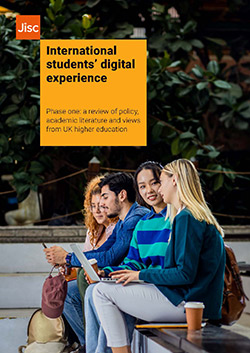Report
International students’ digital experience phase one: a review of policy, academic literature and views from UK higher education

Never has it been so important for us to have a better understanding of the digital experiences and expectations of international students at UK universities. Full-time international students represent 17% of the undergraduate and 67% of the postgraduate taught student population in the UK. They contribute approximately £26 billion per annum to the economy and provide an important and valued contribution to cultural and intellectual diversity and talent.
This report provides an opportunity for readers to view the international student experience through a digital lens, highlighting alternative perspectives and considering issues that might impact the digital experience of international students.
Some academic studies have described the shift from one country’s cultural and educational use of digital to another as a ‘digital shock’ for students, and it can often take months for them to become familiar with systems and processes. Students may arrive with different or unsupported software and hardware, which can hinder their adjustment to their new teaching and learning environment. They might also struggle with online assessment and engaging with digital learning, or grapple with the principles of plagiarism.
Read the full report
pdf, 6.4 MB, 84 pages
Key findings
- Many international students are likely to experience digital systems and tools – and the pedagogy underpinning their use – very differently from domestic students
- As the diversity of UK international student population changes, it is important to consider the impact this may have on the nature and extent of student support required in order that HE courses maximise equitable learning outcomes
- When considering the experience of international students, there is a clear need for institutional leaders to integrate international and digital (transformation) strategies, as well as with other areas, including equality, diversity and inclusion (EDI), curriculum and assessment design and technology-enhanced learning (TEL) support
- Quality international student digital experience may be best delivered via a more holistic and integrative strategic approach that works across and between areas of UK HE and organisational strategy
We would like to acknowledge the contributions to this report from Advance HE, AGCAS, ALT-ELESIG, BUILA, the British Council, the Department for Education, HESA, HeLF, UCAS, UKCISA and UUKi.
Stay informed
Find out more about the project or register your interest to join our mailing list so that we can keep you up to date with our progress.
Our research is split into four phases, with this report resulting from the first. Read our phase two report.
About the authors

